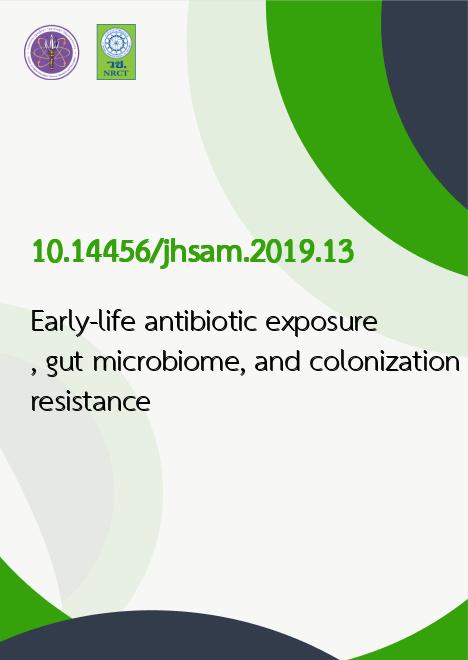
|
Early-life antibiotic exposure, gut microbiome, and colonization resistance |
|---|---|
| รหัสดีโอไอ | |
| Creator | Hein M. TUN |
| Title | Early-life antibiotic exposure, gut microbiome, and colonization resistance |
| Contributor | Roberto BRUZZONE |
| Publisher | School of Health Science Mae Fah Luang University |
| Publication Year | 2562 |
| Journal Title | Journal of Health Science and Alternative Medicine |
| Journal Vol. | 1 |
| Journal No. | 3 |
| Page no. | 1-5 |
| Keyword | gut microbiota, antibiotic exposure |
| URL Website | https://www.tci-thaijo.org/index.php/jhealthscialternmed/article/view/227149/158644 |
| ISSN | 2673-0294 (Online) |
| Abstract | Antibiotics are chemical compounds that inhibit the growth of microorganisms to fight bacterial infections and, therefore, have been a central pillar of modern medicine. In recent years, there has been increasing awareness of the rising rate of their global consumption, especially in younger age groups. Exposure to antibiotics could happen not only during the first few months of newborns, but also indirectly through maternal consumption during pregnancy as well as during delivery. Indeed, epidemiological findings and meta-analyses have confirmed the association between early antibiotic exposures and risks for allergenic diseases and obesity. Recent gut microbiome studies have provided mechanistic evidence supporting the role of antibiotic-induced dysbiotic gut microbiota in developing those diseases. However, no mechanistic evidence is available to convince restorative powers of breastfeeding on the disrupted gut microbiome and intestinal barrier function following antibiotic exposures in early-life. To address the fundamental questions related to complex traits of both exposure to antibiotic and breastfeeding's impacts in early-life, new experimental models are needed to differentiate short- and long-term effects of prenatal vs early postnatal exposure to antibiotics on gut microbiome and resistome (i.e., the collection of antibiotic resistance genes) of newborns. |